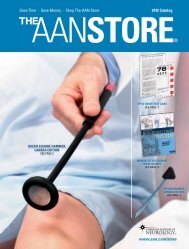Read the Case-Based Curriculum for Neurology Residents.
Read the Case-Based Curriculum for Neurology Residents.
Read the Case-Based Curriculum for Neurology Residents.
You also want an ePaper? Increase the reach of your titles
YUMPU automatically turns print PDFs into web optimized ePapers that Google loves.
m. <strong>Case</strong> Comments<br />
(by James Bemat, MD)<br />
A. Assessmenl<br />
1. What is <strong>the</strong> patient's medical condition and. prognosis? Wat lreatment<br />
options exist?<br />
The patient clearly is at risk <strong>for</strong> developing HD. There is a definire family hisrory<br />
ofan affected parent with HD. Because HD is inherired as an autosomal dominant rair<br />
with complere penerrance, <strong>the</strong> parienr has a 5ovo chance of having inherited rhe HD gene<br />
and developing <strong>the</strong> disease. Most parienrs become symptomaric in <strong>the</strong>ir thirties or fonies<br />
and die after a mean disease durarion of I 7 years. Treatments <strong>for</strong> HD may suppress <strong>the</strong><br />
chorei<strong>for</strong>m movements, but no treatment <strong>for</strong> HD alters its progressive demeniia or irs<br />
inexorably fatal course.<br />
Numerous rests have been proposed <strong>for</strong> <strong>the</strong> presymptomatic d.iagnosis of HD. The<br />
test with rhe greatesr positive predictive value (ppv) and negarive predictive va.lue (Npv)<br />
is that which tests <strong>for</strong> <strong>the</strong> HD gene. Ir has been estimared thit, <strong>for</strong> <strong>the</strong> genetic test, both<br />
<strong>the</strong> PPV and rhe NPV are in <strong>the</strong> 999o range. There<strong>for</strong>e, unlike aI of thi prcviousry<br />
proposed predictive rests' rhe genetic resr is a highly reliable predictor ofdevetoping HD.<br />
2. Who is <strong>the</strong> appropriate d.ecision maker?<br />
Surrogate decision making in HD becomes necessary as <strong>the</strong> disease progrcsses<br />
because dementia worsens and patiens rose <strong>the</strong>ir decision making capacity.' Eiry in <strong>the</strong><br />
course of <strong>the</strong> illness, advance directives shourd be executed in anticipation of this<br />
complication- No surrogates are necessary <strong>for</strong> testing in <strong>the</strong> presympromatic stage if <strong>the</strong><br />
patient is competent and is an adult.<br />
& 4 Wat are <strong>the</strong> patient,s prefcrences? What are <strong>the</strong> preferences of <strong>the</strong><br />
family or surrogate decision makers?<br />
Prcsymptomatic resring <strong>for</strong> HD should be per<strong>for</strong>med only voluntarily at <strong>the</strong><br />
request of an at-risk patient. It should nei<strong>the</strong>r be ordered by o<strong>the</strong>rs nor is ordering<br />
coerced by o<strong>the</strong>rs, such as in this case. It should not be ordered on minors who clnot<br />
give valid consent.<br />
5. Are <strong>the</strong>re interests o<strong>the</strong>r than, and potentialry conJlicting with, those of <strong>the</strong><br />
patient urhich need to be considered?<br />
In this case, <strong>the</strong> prospective inlaws insisr that genetic testing negative <strong>for</strong> HD be a<br />
condition <strong>for</strong> approving <strong>the</strong>ir daughter's marriage. These third-party inierests conflict<br />
with those of <strong>the</strong> patient, who is not ccnain that he wishes to know whe<strong>the</strong>r he is destined<br />
to develop HD later in life. A similar siruation exists when pmspective cmploycrs or<br />
insurcrs demand thar ar-risk patients be tesred. It is not ethically justifiable foi third<br />
parties to require <strong>the</strong> per<strong>for</strong>mance ofa genetic test against <strong>the</strong> will of <strong>the</strong> patient.





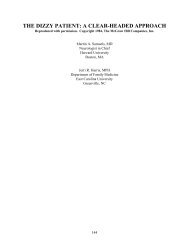
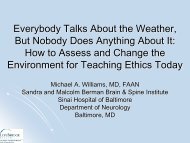
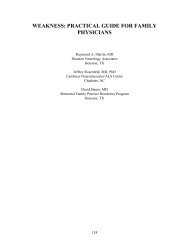
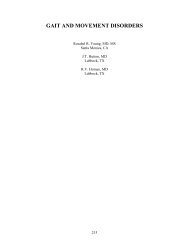
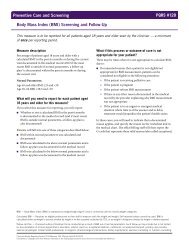
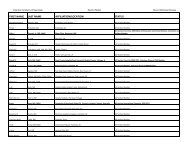
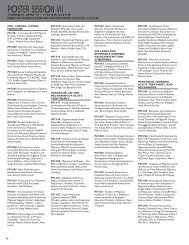
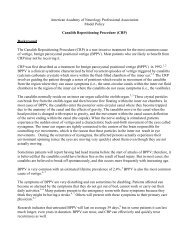
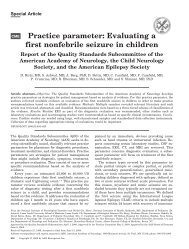
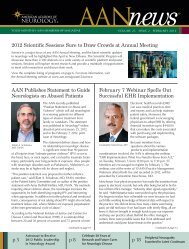
![[Click here and type date] - American Academy of Neurology](https://img.yumpu.com/8582972/1/190x245/click-here-and-type-date-american-academy-of-neurology.jpg?quality=85)
